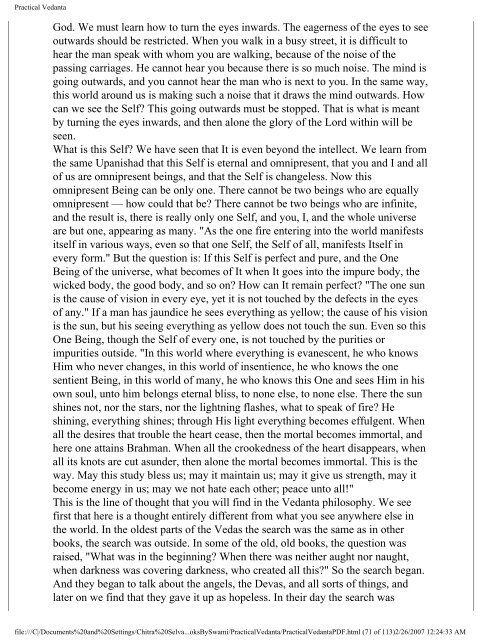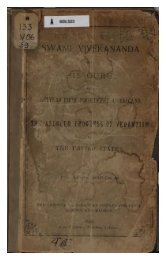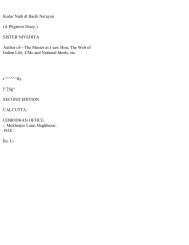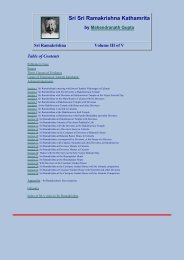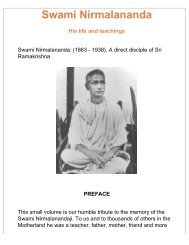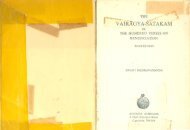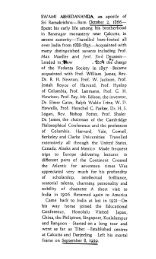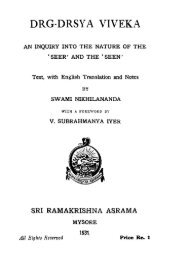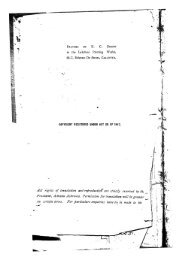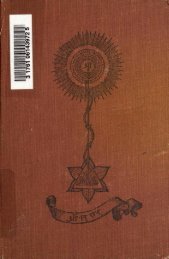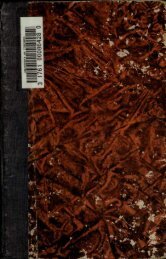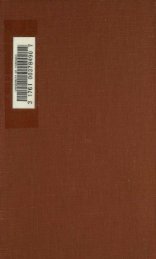<strong>Practical</strong> <strong>Vedanta</strong>causes of God-realisation.) Sitting He goes far, lying He goes everywhere; whoelse but men of purified and subtle understanding are qualified to know the God inwhom all conflicting attributes meet? Without body, yet living in the body,untouched, yet seemingly in contact, omnipresent — knowing the Âtman to besuch, the sage gives up all misery. This Atman is not to be attained by the study ofthe Vedas, nor by the highest intellect, nor by much learning. Whom the Atmanseeks, he gets the Atman; unto him He discloses His glory. He who iscontinuously doing evil deeds, he whose mind is not calm, he who cannotmeditates he who is always disturbed and fickle — he cannot understand andrealise this Atman who has entered the cave of the heart. This body, O Nachiketas,is the chariot, the organs of the senses are the horses, the mind is the reins, theintellect is the charioteer, and the soul is the rider in the chariot. When the souljoins himself with the charioteer, Buddhi or intellect, and then through it with themind, the reins, and through it again with the organs, the horses, he is said to bethe enjoyer; he perceives, he works, he acts. He whose mind is not under control,and who has no discrimination, his senses are not controllable like vicious horsesin the hands of a driver. But he who has discrimination, whose mind is controlled,his organs are always controllable like good horses in the hands of a driver. Hewho has discrimination, whose mind is always in the way to understand truth, whois always pure — he receives that truth, attaining which there is no rebirth. This, ONachiketas, is very difficult, the way is long, and it is hard to attain. It is onlythose who have attained the finest perception that can see it, that can understand it.Yet do not be frightened. Awake, be up and doing. Do not stop till you havereached the goal. For the sages say that the task is very difficult, like walking onthe edge of a razor. He who is beyond the senses, beyond all touch, beyond allform, beyond all taste, the Unchangeable, the Infinite, beyond even intelligence,the Indestructible — knowing Him alone, we are safe from the jaws of death."So far, we see that Yama describes the goal that is to be attained. The first ideathat we get is that birth, death, misery, and the various tossings about to which weare subject in the world can only be overcome by knowing that which is real.What is real? That which never changes, the Self of man, the Self behind theuniverse. Then, again, it is said that it is very difficult to know Him. Knowingdoes not mean simply intellectual assent, it means realisation. Again and again wehave read that this Self is to be seen, to be perceived. We cannot see it with theeyes; the perception for it has to become superfine. It is gross perception by whichthe walls and books are perceived, but the perception to discern the truth has to bemade very fine, and that is the whole secret of this knowledge. Then Yama saysthat one must be very pure. That is the way to making the perception superfine;and then he goes on to tell us other ways. That self-existent One is far removedfrom the organs. The organs or instruments see outwards, but the self-existingOne, the Self, is seen inwards. You must remember the qualification that isrequired: the desire to know this Self by turning the eyes inwards. All thesebeautiful things that we see in nature are very good, but that is not the way to seefile:///C|/Documents%20and%20Settings/Chitra%20Selva...oksBySwami/<strong>Practical</strong><strong>Vedanta</strong>/<strong>Practical</strong><strong>Vedanta</strong>PDF.html (70 of 113)2/26/2007 12:24:33 AM
<strong>Practical</strong> <strong>Vedanta</strong>God. We must learn how to turn the eyes inwards. The eagerness of the eyes to seeoutwards should be restricted. When you walk in a busy street, it is difficult tohear the man speak with whom you are walking, because of the noise of thepassing carriages. He cannot hear you because there is so much noise. The mind isgoing outwards, and you cannot hear the man who is next to you. In the same way,this world around us is making such a noise that it draws the mind outwards. Howcan we see the Self? This going outwards must be stopped. That is what is meantby turning the eyes inwards, and then alone the glory of the Lord within will beseen.What is this Self? We have seen that It is even beyond the intellect. We learn fromthe same Upanishad that this Self is eternal and omnipresent, that you and I and allof us are omnipresent beings, and that the Self is changeless. Now thisomnipresent Being can be only one. There cannot be two beings who are equallyomnipresent — how could that be? There cannot be two beings who are infinite,and the result is, there is really only one Self, and you, I, and the whole universeare but one, appearing as many. "As the one fire entering into the world manifestsitself in various ways, even so that one Self, the Self of all, manifests Itself inevery form." But the question is: If this Self is perfect and pure, and the OneBeing of the universe, what becomes of It when It goes into the impure body, thewicked body, the good body, and so on? How can It remain perfect? "The one sunis the cause of vision in every eye, yet it is not touched by the defects in the eyesof any." If a man has jaundice he sees everything as yellow; the cause of his visionis the sun, but his seeing everything as yellow does not touch the sun. Even so thisOne Being, though the Self of every one, is not touched by the purities orimpurities outside. "In this world where everything is evanescent, he who knowsHim who never changes, in this world of insentience, he who knows the onesentient Being, in this world of many, he who knows this One and sees Him in hisown soul, unto him belongs eternal bliss, to none else, to none else. There the sunshines not, nor the stars, nor the lightning flashes, what to speak of fire? Heshining, everything shines; through His light everything becomes effulgent. Whenall the desires that trouble the heart cease, then the mortal becomes immortal, andhere one attains Brahman. When all the crookedness of the heart disappears, whenall its knots are cut asunder, then alone the mortal becomes immortal. This is theway. May this study bless us; may it maintain us; may it give us strength, may itbecome energy in us; may we not hate each other; peace unto all!"This is the line of thought that you will find in the <strong>Vedanta</strong> philosophy. We seefirst that here is a thought entirely different from what you see anywhere else inthe world. In the oldest parts of the Vedas the search was the same as in otherbooks, the search was outside. In some of the old, old books, the question wasraised, "What was in the beginning? When there was neither aught nor naught,when darkness was covering darkness, who created all this?" So the search began.And they began to talk about the angels, the Devas, and all sorts of things, andlater on we find that they gave it up as hopeless. In their day the search wasfile:///C|/Documents%20and%20Settings/Chitra%20Selva...oksBySwami/<strong>Practical</strong><strong>Vedanta</strong>/<strong>Practical</strong><strong>Vedanta</strong>PDF.html (71 of 113)2/26/2007 12:24:33 AM
- Page 1 and 2:
Practical VedantaPractical VedantaP
- Page 3 and 4:
Practical Vedantaworld. If I am a s
- Page 5 and 6:
Practical Vedantadifference is only
- Page 7 and 8:
Practical VedantaThe ideal of faith
- Page 9 and 10:
Practical Vedantamoment of our live
- Page 11 and 12:
Practical Vedantaof the Christs and
- Page 13 and 14:
Practical Vedanta"This life is Brah
- Page 15 and 16:
Practical Vedantadark fifteen days,
- Page 17 and 18:
Practical Vedantalife. This is the
- Page 19 and 20: Practical Vedantaeverything would b
- Page 21 and 22: Practical Vedantait is only through
- Page 23 and 24: Practical Vedantawhich is that subt
- Page 25 and 26: Practical Vedantanoumenon and pheno
- Page 27 and 28: Practical Vedantato which is the be
- Page 29 and 30: Practical VedantaAbsolute.The finit
- Page 31 and 32: Practical Vedantawhich is not the q
- Page 33 and 34: Practical Vedantaexperience that th
- Page 35 and 36: Practical Vedantafulfilled. The Jiv
- Page 37 and 38: Practical Vedantabetween the pure r
- Page 39 and 40: Practical Vedantacome out straight.
- Page 41 and 42: Practical Vedantawar with one anoth
- Page 43 and 44: Practical Vedantanobody could under
- Page 45 and 46: Practical VedantaMy idea, therefore
- Page 47 and 48: Practical Vedantathe same methods.
- Page 49 and 50: Practical Vedantavarious minds, all
- Page 51 and 52: Practical Vedantabrotherhood; but t
- Page 53 and 54: Practical Vedantabrotherhood, but w
- Page 55 and 56: Practical Vedantawe all go with ves
- Page 57 and 58: Practical Vedantareason. What can y
- Page 59 and 60: Practical Vedantabeen preached in t
- Page 61 and 62: Practical Vedantathe husband kisses
- Page 63 and 64: Practical Vedantaof the knowledge a
- Page 65 and 66: Practical Vedantafor those who only
- Page 67 and 68: Practical Vedantasun exists because
- Page 69: Practical Vedantaof death was pleas
- Page 73 and 74: Practical Vedantaa plague comes, it
- Page 75 and 76: Practical VedantaAtman? "As with a
- Page 77 and 78: Practical Vedantathat immortal One,
- Page 79 and 80: Practical Vedantaand the third egoi
- Page 81 and 82: Practical VedantaWitness of the uni
- Page 83 and 84: Practical VedantaPractical Vedanta1
- Page 85 and 86: Practical Vedantaeternal ; every ot
- Page 87 and 88: Practical Vedantafaculty, Buddhi, w
- Page 89 and 90: Practical VedantaPractical Vedanta1
- Page 91 and 92: Practical Vedantastepping-stone to
- Page 93 and 94: Practical Vedantarecognition? Findi
- Page 95 and 96: Practical Vedantasentient." This is
- Page 97 and 98: Practical Vedantaessentially differ
- Page 99 and 100: Practical Vedantaexistence is limit
- Page 101 and 102: Practical Vedantalive, for I am lif
- Page 103 and 104: Practical Vedantasee from Kapila's
- Page 105 and 106: Practical Vedantalimitation, but th
- Page 107 and 108: Practical Vedantaperfect, infinite,
- Page 109 and 110: Practical Vedantaindividuality, of
- Page 111 and 112: Practical Vedantarepeat [something]
- Page 113: Practical Vedantaperson who dies in


